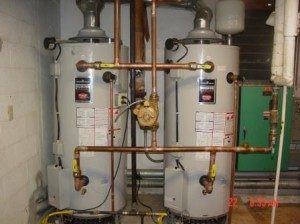Water heaters come in all shapes and sizes. You could have one with a tank or one without a tank. Your home or apartment probably has its own tank but some renters might have a shared water heater with their neighbors.
Your water heater is more than likely tucked away somewhere in a closet, basement or garage. You might really like that it’s out of sight out of mind. However, it could be dangerous to put off inspections and maintenance.
Even if it’s producing hot water just fine, your water heater has the potential to explode. Water heater explosions can be deadly and cause catastrophic damage to your home.
They’re even more common than you might think. In February, a water heater explosion caused a Louisiana home to burn down and in March three people were burned by a water heater explosion in Arizona.
The MythBusters even tested hot water tank explosions on the Discovery Channel. They tried blowing up three sizes of tanks. The smallest tank didn’t explode, the medium tank blew up and the largest tank rocketed hundreds of feet into the air and created lethal shock levels.
What Causes Water Heater Explosions?
Perhaps the scariest part is that there are multiple issues that can result in these explosions. Your water heater is equipped with safety mechanisms that need to be working properly in order to keep yourself safe.
Increased temperature and/or pressure is needed to blow up a water heater tank. High temperatures can cause water vapor to build up and if your relief valves are clogged then the gas will be unable to escape, causing an explosion.
If your pressure relief valve is broken or the high temperature cut off switch is broken, the pressure in your heater could build to dangerous levels and erupt. Especially if your heater is set above the average temperature of 120-125 degrees.
If rust or sediment build up in your heater it can cause structural integrity and functional issues. This could make your water heater explode but it wouldn’t be as severe. Sediment buildups are especially common in areas with harder water. Hard water has a higher amount of dissolved minerals such as calcium and magnesium.
Lastly, your water heater can cause an explosion that does not start in the tank. If gas from your water heater leaks into a room, something such as a pilot light or lighter could spark an explosion. These kinds of blasts are very deadly.
How to Prevent Water Heater Explosions
The good news is that the majority of people’s water heaters function perfectly and never result in an explosion. This is especially true of water heaters that are properly installed and regularly inspected by a licensed plumber.
Here are some tips for preventing eruptions:
- Do not tape over or cover any perforations or openings on the water tank
- Get your water tank inspected, serviced and cleaned annually by a certified plumber
- Keep pressure relief valve full and operational
- Maintain a water temperature of 120-125 degrees and no higher
If you start noticing issues with your water heater you should try and address them immediately. There are many things that could be warning signs for a faulty water heater. Here is a list to look out for:
- Excessively leaking pressure relief valve
- Popping noises
- Pressure relief valve is constantly open
- Leaking water tank
- Rotten egg smell
- Failed temperature limit switch
A big safety improvement you can make is switching your heater to a tankless version. These more modern options are safer with no danger of blowing up. There are still precautions you have to take though in order to prevent carbon monoxide poisoning.
Get Proactive with Your Plumbing
The best way to keep your family safe and your water warm is to take proper care of your hot water heater each year. Mike Wilson Plumbing specializes in installing and repairing hot water heaters.
Households in the Richmond, Virginia area can rely on our team of certified plumbers to keep their water heaters running smoothly.

